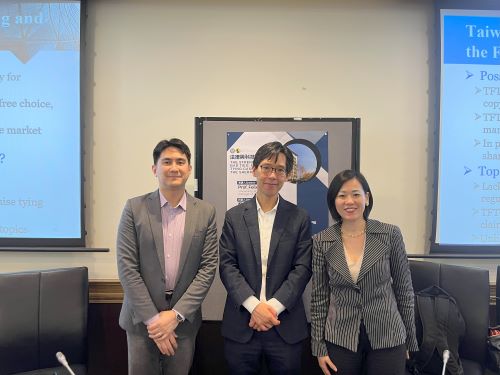Professor Felix Chang’s Insight into the Strength of Bad Ties: Modeling Tying Caselaw the Sherman Act

On May 20, 2024, The Asia WTO and International Health Law and Policy Research Center (ACWH) invited Professor Felix Chang from the Ohio State University Moritz College of Law to give a lecture on “The Strength of Bad Ties: Modeling Tying Caselaw under the Sherman Act.” The lecture featured commentary by Professor Ya-Lun Yen, who is an Associate Professor in the Department of Law at National Cheng Kung University and also Commissioner of the Fair Trade Commission. The event was moderated by Associate Professor Yueh-Ping (Alex) Yang in ACWH.
During the lecture, Professor Chang began by introducing a website called Model of Model. He detailed how the website can find connections between cases by entering keywords and demonstrated this by inputting several commonplace terms from antitrust law to show the search results. Interestingly, entering identical keywords in different databases often yields completely different results. Professor Chang also used Social Tie Theory to explain the messiness observed in past antitrust rulings. In the subsequent discussion, when asked whether the case-connection websites could help analyze and predict future rulings, Professor Chang responded that scholars rarely make such bold assumptions. Instead, it is more likely that startup companies would attempt such analyses.
Professor Yen’s commentary focused on the current situation in Taiwan. She highlighted that the most significant difference in Taiwan’s legal system compared to other countries is that the Fair Trade Act in Taiwan was enacted in 1991, and it is called the Fair Trade Act rather than Antitrust Law. Unlike in the United States, where websites can systematically search for judgments, similar research in Taiwan needs to be conducted manually. Professor Yen used the term “tying” as an example, noting that no matter the judgment search system or the administrative penalty decisions, relevant judgments or decisions related to tying are rare. Instead, many cases are related to the telecommunications industry and the National Communications Commission (NCC). She speculated that this phenomenon might be because of the past regulatory authority’s rigid attitude of categorically considering all tying arrangements as illegal.
Overall, the two professors provided insights into the similarities and differences in keyword search results between U.S. and Taiwanese law. Both systems will require extracting useful information from vast amounts of data. However, the differences are the search methods and legislative contexts. This discussion, approached from diverse perspectives, was highly enlightening.